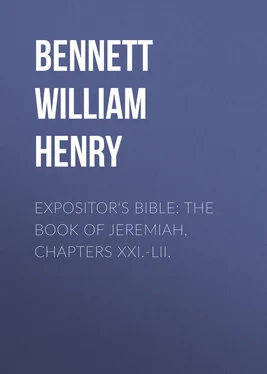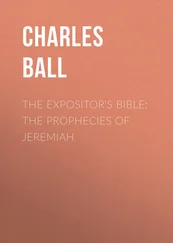William Bennett - Expositor's Bible - The Book of Jeremiah, Chapters XXI.-LII.
Здесь есть возможность читать онлайн «William Bennett - Expositor's Bible - The Book of Jeremiah, Chapters XXI.-LII.» — ознакомительный отрывок электронной книги совершенно бесплатно, а после прочтения отрывка купить полную версию. В некоторых случаях можно слушать аудио, скачать через торрент в формате fb2 и присутствует краткое содержание. Издательство: Иностранный паблик, Жанр: foreign_religion, foreign_antique, foreign_prose, на английском языке. Описание произведения, (предисловие) а так же отзывы посетителей доступны на портале библиотеки ЛибКат.
- Название:Expositor's Bible: The Book of Jeremiah, Chapters XXI.-LII.
- Автор:
- Издательство:Иностранный паблик
- Жанр:
- Год:неизвестен
- ISBN:нет данных
- Рейтинг книги:5 / 5. Голосов: 1
-
Избранное:Добавить в избранное
- Отзывы:
-
Ваша оценка:
- 100
- 1
- 2
- 3
- 4
- 5
Expositor's Bible: The Book of Jeremiah, Chapters XXI.-LII.: краткое содержание, описание и аннотация
Предлагаем к чтению аннотацию, описание, краткое содержание или предисловие (зависит от того, что написал сам автор книги «Expositor's Bible: The Book of Jeremiah, Chapters XXI.-LII.»). Если вы не нашли необходимую информацию о книге — напишите в комментариях, мы постараемся отыскать её.
Expositor's Bible: The Book of Jeremiah, Chapters XXI.-LII. — читать онлайн ознакомительный отрывок
Ниже представлен текст книги, разбитый по страницам. Система сохранения места последней прочитанной страницы, позволяет с удобством читать онлайн бесплатно книгу «Expositor's Bible: The Book of Jeremiah, Chapters XXI.-LII.», без необходимости каждый раз заново искать на чём Вы остановились. Поставьте закладку, и сможете в любой момент перейти на страницу, на которой закончили чтение.
Интервал:
Закладка:
At this point again the sequence of events is not clear; possibly the account was compiled from the imperfect recollections of more than one of the spectators. The pronouncement of the princes and the people seems, at first sight, a formal acquittal that should have ended the trial, and left no room for the subsequent intervention of "certain of the elders," otherwise the trial seems to have come to no definite conclusion, and the incident simply terminated in the personal protection given to Jeremiah by Ahikam ben Shaphan. Possibly, however, the tribunal of the princes was not governed by any strict rules of procedure; and the force of the argument used by the elders does not depend on the exact stage of the trial at which it was introduced.
Either Jeremiah was not entirely successful in his attempt to get the matter disposed of on the sole ground of his own prophetic authority, or else the elders were anxious to secure weight and finality for the acquittal, by bringing forward arguments in its support. The elders were an ancient Israelite institution, and probably still represented the patriarchal side of the national life; nothing is said as to their relation to the princes, and this might not be very clearly defined. The elders appealed, by way of precedent, to an otherwise unrecorded incident of the reign of Hezekiah. Micah the Morasthite had uttered similar threats against Jerusalem and the Temple: "Zion shall be ploughed as a field, and Jerusalem shall become heaps, and the mountain of the house as the high places of the forest." 21 21 Micah iii. 12. As the quotation exactly agrees with the verse in our extant Book of Micah, we may suppose that the elders were acquainted with his prophecies in writing.
But Hezekiah and his people, instead of slaying Micah, had repented, and the city had been spared. They evidently wished that the precedent could be wholly followed in the present instance; but, at any rate, it was clear that one of the most honoured and successful of the kings of Judah had accepted a threat against the Temple as a message from Jehovah. Therefore the mere fact that Jeremiah had uttered such a threat was certainly not primâ facie evidence that he was a false prophet. We are not told how this argument was received, but the writer of the chapter, possibly Baruch, does not attribute Jeremiah's escape either to his acquittal by the princes or to the reasoning of the elders. The people apparently changed sides once more, like the common people in the New Testament, who heard Christ gladly and with equal enthusiasm clamoured for His crucifixion. At the end of the chapter we find them eager to have the prophet delivered into their hands that they may put him to death. Apparently the prophets and priests, having brought matters into this satisfactory position, had retired from the scene of action; the heretic was to be delivered over to the secular arm. The princes, like Pilate, seemed inclined to yield to popular pressure; but Ahikam, a son of the Shaphan who had to do with the finding of Deuteronomy, stood by Jeremiah, as John of Gaunt stood by Wyclif, and the Protestant Princes by Luther, and the magistrates of Geneva by Calvin; and Jeremiah could say with the Psalmist: —
"I have heard the defaming of many,
Terror on every side:
While they took counsel together against me,
They devised to take away my life.
But I trusted in Thee, O Jehovah:
I said, Thou art my God.
My times are in Thy hand:
Deliver me from the hand of mine enemies, and from them that persecute me.
Let the lying lips be dumb,
Which speak against the righteous insolently,
With pride and contempt.
Oh, how great is Thy goodness, which Thou hast laid up for them that fear Thee,
Which Thou hast wrought for them that put their trust in Thee, before the sons of men." 22 22 Psalm xxxi. 13-15, 18, 19. The Psalm is sometimes ascribed to Jeremiah, because it can be so readily applied to this incident. The reader will recognise his characteristic phrase "Terror on every side" (Magor-missabib).
We have here an early and rudimentary example of religious toleration, of the willingness, however reluctant, to hear as a possible Divine message unpalatable teaching, at variance with current theology; we see too the fountain-head of that freedom which since has "broadened down from precedent to precedent."
But unfortunately no precedent can bind succeeding generations, and both Judaism and Christianity have sinned grievously against the lesson of this chapter. Jehoiakim himself soon broke through the feeble restraint of this new-born tolerance. The writer adds an incident that must have happened somewhat later, 23 23 This incident cannot be part of the speech of the elders; it would only have told against the point they were trying to make. The various phases – prophesy, persecution, flight, capture, and execution – must have taken some time, and can scarcely have preceded Jeremiah's utterance "at the beginning of the reign of King Jehoiakim."
to show how real was Jeremiah's danger, and how transient was the liberal mood of the authorities. A certain Uriah ben Shemaiah of Kirjath Jearim had the courage to follow in Jeremiah's footsteps and speak against the city "according to all that Jeremiah had said." With the usual meanness of persecutors, Jehoiakim and his captains and princes vented upon this obscure prophet the ill-will which they had not dared to indulge in the case of Jeremiah, with his commanding personality and influential friends. Uriah fled into Egypt, but was brought back and slain, and his body cast out unburied into the common cemetery. We can understand Jeremiah's fierce and bitter indignation against the city where such things were possible.
This chapter is so full of suggestive teaching that we can only touch upon two or three of its more obvious lessons. The dogma which shaped the charge against Jeremiah and caused the martyrdom of Uriah was the inviolability of the Temple and the Holy City. This dogma was a perversion of the teaching of Isaiah, and especially of Jeremiah himself, 24 24 Assuming his sympathy with Deuteronomy.
which assigned a unique position to the Temple in the religion of Israel. The carnal man shows a fatal ingenuity in sucking poison out of the most wholesome truth. He is always eager to discover that something external, material, physical, concrete – some building, organisation, ceremony, or form of words – is a fundamental basis of the faith and essential to salvation. If Jeremiah had died with Josiah, the "priests and prophets" would doubtless have quoted his authority against Uriah. The teaching of Christ and His apostles, of Luther and Calvin and their fellow-reformers, has often been twisted and forged into weapons to be used against their true followers. We are often tempted in the interest of our favourite views to lay undue stress on secondary and accidental statements of great teachers. We fail to keep the due proportion of truth which they themselves observed, and in applying their precepts to new problems we sacrifice the kernel and save the husk. The warning of Jeremiah's persecutors might often "give us pause." We need not be surprised at finding priests and prophets eager and interested champions of a perversion of revealed truth. Ecclesiastical office does not necessarily confer any inspiration from above. The hereditary priest follows the traditions of his caste, and even the prophet may become the mouthpiece of the passions and prejudices of those who accept and applaud him. When men will not endure sound doctrine, they heap to themselves teachers after their own lusts; having itching ears, they turn away their ears from the truth and turn unto fables. 25 25 2 Tim. iv. 3.
Jeremiah's experience shows that even an apparent consensus of clerical opinion is not always to be trusted. The history of councils and synods is stained by many foul and shameful blots; it was the Œcumenical Council at Constance that burnt Huss, and most Churches have found themselves, at some time or other, engaged in building the tombs of the prophets whom their own officials had stoned in days gone by. We forget that Athanasius contra mundum implies also Athanasius contra ecclesiam .
Интервал:
Закладка:
Похожие книги на «Expositor's Bible: The Book of Jeremiah, Chapters XXI.-LII.»
Представляем Вашему вниманию похожие книги на «Expositor's Bible: The Book of Jeremiah, Chapters XXI.-LII.» списком для выбора. Мы отобрали схожую по названию и смыслу литературу в надежде предоставить читателям больше вариантов отыскать новые, интересные, ещё непрочитанные произведения.
Обсуждение, отзывы о книге «Expositor's Bible: The Book of Jeremiah, Chapters XXI.-LII.» и просто собственные мнения читателей. Оставьте ваши комментарии, напишите, что Вы думаете о произведении, его смысле или главных героях. Укажите что конкретно понравилось, а что нет, и почему Вы так считаете.












